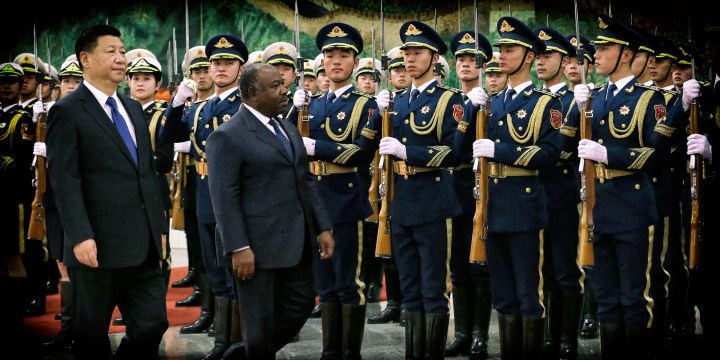Op-Ed
China’s belt and road initiative and Africa’s development

From the G20 Summit 2017 to the EU-Africa Business Summit 2019, Africa remains relevant in the international arena. The current interest of the rising economic giant (China), in Africa has stirred international attention as it solidifies a path for the ‘New Scramble for Africa’. Preoccupied with her past and possible ‘worst-case scenarios’ painted by the West, Africa could possibly be missing out on a worthwhile opportunity to support its own development through the Belt and Road Initiative.
China’s Belt and Road Initiative (BRI), engineered and revered by Chinese President Xi Jinping, is an effort focused on the development of infrastructure and the construction of an economic belt, which will consequently connect Asia, Europe and Africa. Its intent is to boost the world’s economy, especially international trade, finance and tourism. Critics, however, have summed it up to be nothing more than “an effort to mask the strategic expansion of Chinese power”.
Nevertheless, the “threat” caused by the BRI can be viewed as exaggerated. Subsequently, there are equal benefits and drawbacks to the BRI, or African development. Irrespective of the investor, Africa must learn from its colonial past.
Various authors have purported that it is through large scale “commitments” that China is leveraging the massive loans it holds over small states worldwide to snatch assets and increase its military footprint. The British and the Dutch empires were the poster children of strategic, and economic imperialism, having milked the African continent for all it’s worth, leaving it high and dry. This was done in the name of “trade and aid”. In 2012, the vice president of China Exim Bank, Zhu Hongjie, called for an “expansion of foreign aid”, including “concessional lending”, to improve the efficiency with which China’s aid can promote China’s export while at the same time helping reputable Chinese enterprise to increase the development capacity of developing countries.
In 2015, China loaned $12-billion to African countries, and in the same year, a further $3-billion, allowing us to witness the force of Chinese globalisation. Moreover, the share of African workers in Chinese infrastructure projects on the continent is often perceived to be too low. In Nigeria, politicians worrying about jobs for locals recently discussed a loan offered by China Exim Bank, which supposedly came with the condition that the projects must be done by Chinese workers. What is more worrisome is that “of an estimated 10,000 Chinese businesses in Africa, 90% are privately owned, rather than state-run, therefore indicative of the fact that private Chinese industry is taking hold of Africa”.
A similar scenario is seen in Kenya, where direct investments by foreigners are facilitated by the Investment Promotion Authority, which grants licenses to foreign companies without the obligation of partnership with a local company. In 2012, there were reportedly 67 Chinese companies registered in Kenya, including 25 in the building and construction sector and nine in real estate.
The argument therefore is: In the likelihood of a “masked Chinese agenda” disguised within this new Sino-Africa relation, the responsibility is left to African leaders to be vigilant in securing the continent’s interests having learnt from colonial predecessors. “China needs Africa and Africa needs China, we need to strengthen our ties,” said Tony Dong, the Head of the Federation of Sino-European Entrepreneurs.
China has the skill set, technology and financial capacity to assemble Africa through the BRI. This also comes at a time when Africa needs to improve its infrastructure, particularly energy, roads and railways. For instance, countries such as Gabon are a prime example of this as its partnership with China makes provision for growth.
For years, Gabon, a central African country, had wanted to improve the transport network of its crumbling French colonial buildings and dilapidated roads. On the surface, this (Sino-Africa relations), appears as a simple mutual trade. Although a more primitive look at this partnership implores the question of whether this is truly an authentic common trading agreement, or a repackaged colonialistic strategy.
This is not to say the BRI undertaking is a bad initiative since it will spur development across the African continent if it’s successfully implemented. However, one must not easily dismiss the negative implications behind supporting the BRI. Support means boosting China’s political and economic power across much of the world. This could be easily achieved by exploring ways to best utilise the BRI’s immense offerings and grow Africa’s interests.
Therefore, whether China or another investor supports colonialism in the name of development, a tougher and goal-oriented approach should always be used by African governments towards implementation and sustainable development, says one analyst.
In conclusion, there are advantages to be shared between countries involved in the BRI. Of course, like any other large-scale initiative, there are risks. If these risks are properly managed, they will not hamper the progress of continental upgrading. Consequently, although China claims to come in peace bearing gifts, a cautionary tale for Africans to remember is that “clean gloves hide dirty hands”. DM
Chazha Ludo Macheng is a master’s degree student in international business at the School of Economics and Management of Wuhan University. Macheng is originally from Botswana.


















 Become an Insider
Become an Insider